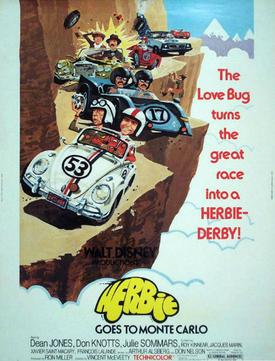Recently I have watched a few of the old "Herbie the Love Bug" films. They are fun movies, and we can learn something from them about personhood, which is fun too.
So Herbie is a personified car: he (how is Herbie a "he"?) is a car that is given the traits of a person.
If something is given the traits of a person that, of course, tells us something about what persons are or what it is to be a person.
(That Herbie doesn't exist or is a fiction doesn't matter to this: whether something actually exists or not is not relevant to whether a concept or idea describes, or would describe, that thing: e.g., a fictional or made-up house still exemplifies the concept of "house" even though it doesn't really exist).
So why is Herbie a person, or what personifies Herbie?
It seems like the more immediate answers are along these lines: Herbie is personified, and so displays the characteristics of a person, because:
- he is aware of things: he knows where things and people are,
- he has beliefs,
- he has desires,
- he has preferences,
- he has emotions,
- he has a memory,
- he has goals and the like:
- in "Herbie Goes to Monte Carlo" he even has romantic interests!
This seems to be a good explanation of why Herbie is a person and so what personhood is. We discuss this explanatory theory of personhood here, and observe that this theory implies that early fetuses are not persons since they completely lack any of the above or anything like it: they are completely without minds.
A different answer to what personifies Herbie is this: Herbie is personified in that Herbie is presented as having a rational nature or essence.
Here I am not going to discuss this proposal, but instead just ask three questions about it:
- how is saying that "Herbie has a rational nature or essence" different from saying "Herbie is rational"?
- how is saying that "Herbie has a rational nature or essence" related to Herbie being rational?
- most importantly, is the explanation that Herbie is personified because of his rational nature or essence better or worse than the explanation that Herbie is personified because he is conscious, aware, has thoughts, feelings, beliefs, preferences, and so on? Whatever one's answer, why? And how does one decide these issues?
Some discussion relevant to evaluating the "rational nature or essence" proposal for personhood is here and here.
As a reminder, why are we talking about Herbie? Because thinking about Herbie (and other examples, especially ones from real life) can help us better understand what persons are, and what persons are is surely relevant to evaluating many arguments about abortion and other important ethical issues.
- All other blog posts are available here: here are some of them:
Is abortion "healthcare"?
"Fetuses are human beings; all human beings are equal in dignity & worth; so abortion is wrong." Good or bad argument?
Pro-life virtues and vices? Pro-choice virtues and vices? On sex/gender and arguments
"Force birther"-ism and Virtue Signaling
Is the "bodily autonomy" argument for abortion *that* simple?
Are you part of a cult about abortion, or anything else?
Trent Horn on "The Problem of Personhood"
'Yes, "a person is a person, no matter how small," but . .'
"If abortion is not wrong, then it's OK to kill sleeping people??!"
"When does life begin?' and 'Are fetuses human?': Two bad questions to ask about abortion"

No comments:
Post a Comment